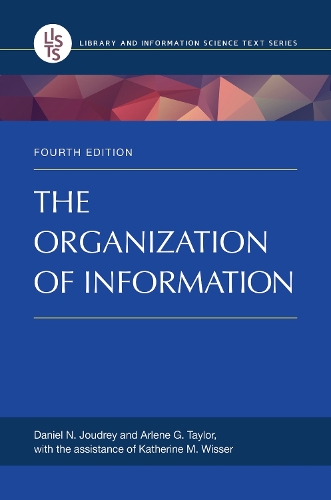
The Organization of Information
(Paperback, 4th edition)
Available Formats
Paperback, 4th edition
Published: 27th November 2017
Hardback, 4th edition
Published: 27th November 2017
Paperback, 5th edition
Published: 13th November 2025
Hardback, 5th edition
Published: 13th November 2025
Publishing Details
The Organization of Information
By (Author) Daniel N. Joudrey
By (author) Arlene G. Taylor
Bloomsbury Publishing PLC
Libraries Unlimited Inc
27th November 2017
4th edition
United States
Classifications
Tertiary Education
Non Fiction
025
Physical Properties
Paperback
744
Width 178mm, Height 254mm
1503g
Description
This fourth edition provides an updated look at information organization, featuring coverage of the Semantic Web, linked data, and EAC-CPF; new metadata models such as IFLA-LRM and RiC; and new perspectives on RDA and its implementation. This latest edition of The Organization of Information is a key resource for anyone in the beginning stages of their LIS career as well as longstanding professionals and paraprofessionals seeking accurate, clear, and up-to-date guidance on information organization activities across the discipline. The book begins with a historical look at information organization methods, covering libraries, archives, museums, and online settings. It then addresses the types of retrieval tools used throughout the disciplinecatalogs, finding aids, indexes, bibliographies, and search enginesbefore describing the functionality of systems, explaining the basic principles of system design, and defining how they affect information organization. The principles and functionality of metadata is next, with coverage of the types, functions, tools, and models (particularly FRBR, IFLA-LRM, RDF) and how encoding works for use and sharingfor example, MARC, XML schemas, and linked data approaches. The latter portion of the resource describes specific activities related to the creation of metadata for resources. These chapters offer an overview of the major issues, challenges, and standards used in the information professions, addressing topics such as resource description (including standards found in RDA, DACS, and CCO), access points, authority control, subject analysis, controlled vocabulariesnotably LCSH, MeSH, Sears, and AATand categorization systems such as DDC and LCC.
Author Bio
Daniel N. Joudrey, MLIS, PhD, is professor in the School of Library and Information Science, Simmons College, Boston, MA, where he teaches information organization, subject cataloging and classification, and descriptive cataloging. Arlene G. Taylor, MSLS, PhD, is professor emerita, School of Information Sciences, University of Pittsburgh. Her experience as a library school educator covered more than 30 years, and she was active in the American Library Association for more than 30 years. Katherine M. Wisser, MA, MSLS, PhD, is associate professor at the School of Library and Information Science, Simmons College, Boston, MA, where she teaches information organization, archival access and use, metadata, indexing and thesaurus construction, and the history of libraries.
